Chinese eBook market is thriving. According to the 2021 China Digital Reading Report published by China Audio-video and Digital Publishing Association, the population of Chinese digital reading users in 2020 has reached 494 million, which was an increase of 5.56% over 2019. The digital reading industry market size was RMB35.16 billion, boasting an increase of 21.8% over 2019.
Chinese citizens are trying to embrace eBook and have gradually replaced the habit of reading paper books. In 2021, the average eBook reading duration per user was 79.3 minutes while it was only 63.2 minutes for paper reading. It implies that people reading eBooks are more avid readers. Moreover, the reading volume of eBooks per capita in China was 9.1 books in 2020 and recorded a 5.5% Y-o-Y growth. However, the reading volume of traditional books per capita in China was 6.2 books only in 2020, which is 2.6 books less than that in 2019.
Break down into each age group segment, Gen Z is the main force supporting digital reading in China: according to the 18th National Reading Survey by Chinese Academy of Press and Publication, young Chinese aged between 18 and 29 years old accounted for 31% of overall Chinese eBook readers in 2020. It is worth noting that the group of people aged 50 and above are getting increasingly more open minded towards digital reading as well. In fact, the elderly accounted for 23.2% of eBook readers in 2020, recording a 2.8% increase compared to 2019.
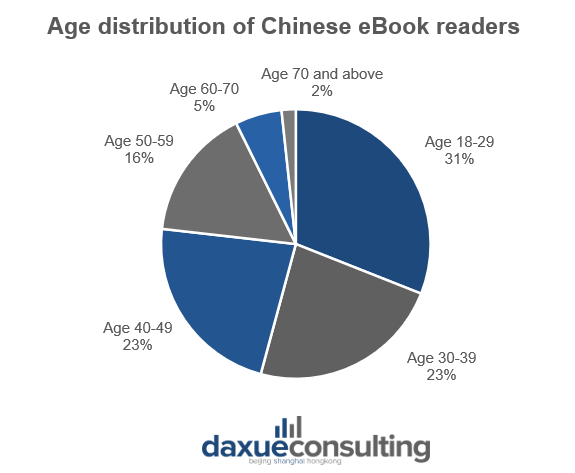
How the macro environment is promoting the development of the Chinese eBook market
Enhance in quality of life and the pandemic factor
China’s quality of life has gradually improved since the launch of Deng Xiaoping’s reforms in 1978. As Chinese citizens have greater income and higher education level, they create a reading habit, thus supporting the development of the Chinese eBook market. With technological advancement, people require more trendy reading experience, so eBooks have become a popular option among Chinese citizens. Especially during Covid-19, due to the inconvenience of express logistics, the free opening of various e-reading resources and the abundant leisure time, there was a rise of the stay-at-home economy which boosted the number of Chinese eBook readers and the amount of online reading time significantly. According to a report by New Times Securities, over 70% of respondents spent more time reading than before the pandemic. During the 2020 Chinese New Year holiday, the average daily number of independent devices logging into mobile reading APPs reached 133 million, which is a Y-o-Y growth of 6.67%. On the other hand, users got more consistent during the pandemic: 80% of respondents who have been reading eBooks for less than a year said they would continue to read digital books in the future.
Increase of digital adoption rate
The extensive digital adoption in China provided the essential condition for eBooks to thrive as well. In recent years, both the internet penetration rate and the population of netizens have surged. According to 49th China Statistical Report on Internet Development by CNNIC, Chinese netizens surpassed 1 billion as of December 2021, an increase of 42.96 million compared with December 2020, while the internet penetration rate reached 73.0%, showing a 2.6% y-o-y growth. The widespread of internet and smart devices is allowing user to read anytime and anywhere. At the same time, the development of reading hardware equipment is prompting the digital reading habit, as people can read more conveniently.
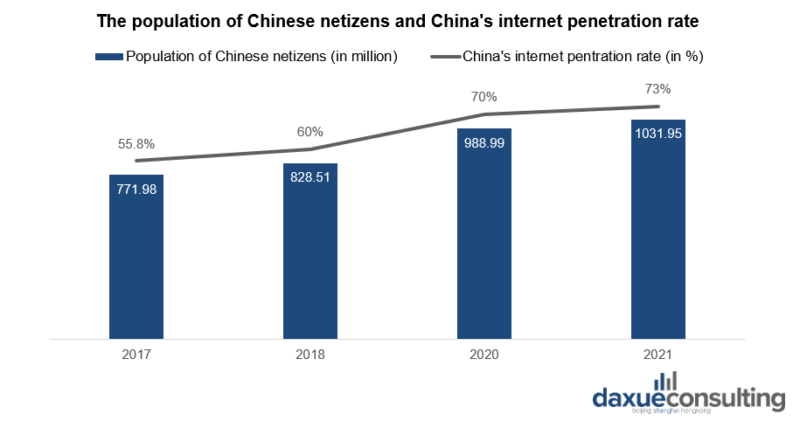
Digital payment services
On the other hand, the ease of digital payment is increasing Chinese citizens’ willingness to purchase eBooks. Indeed, third-party platforms such as Alipay and WeChat Pay are making online payments increasingly easier and more efficient. According to CNNIC, online payment users in China reached 904 million in 2021, accounting for 87.6% of the total netizens. Also, new payment methods such as 1-click ordering on Kindle and the biometric payment of Apple Pay further simplified payment procedures for customers. The payment technology increased the payment ratio and promoted the development of digital reading.
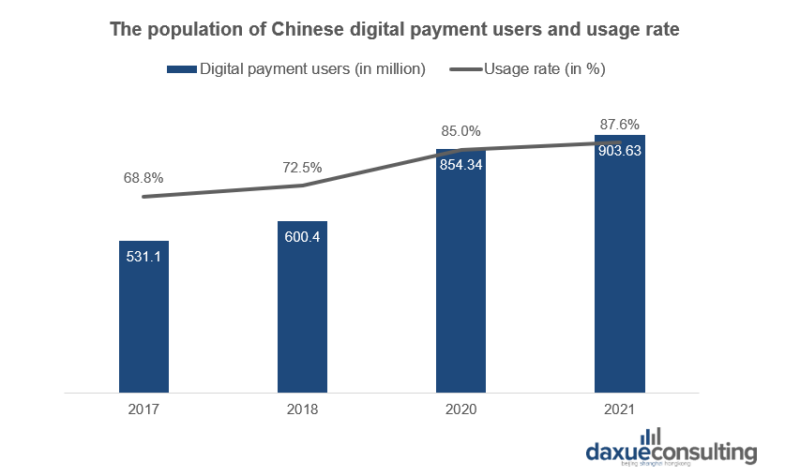
Why Chinese netizens prefer eBooks
Apart from the macro environment factors, the inherent features of eBooks are very attractive to Chinese netizens. Firstly, the cost of eBooks is a lot cheaper than traditional books. Chinese netizens expressed that as eBooks only cost half of their printed version, they feel encouraged to read more. Secondly, eBooks are portable. This increases consumers’ reading efficiency as they can make use of their pocket of time. Chinese netizens expressed that they could read 10 books a year after they buy eBooks, but they could just read 3 paper books. Thirdly, eBooks have a strong advantage in information retrieval. For example, “Hanfen”(涵芬) APP launched in 2020 by The Commercial Press, provides students with intelligent one-stop vocabulary query and learning materials, by relying on 27 prestigious and authoritative dictionaries such as “Xinhua Dictionary” and “Modern Chinese Dictionary”. Moreover, through using this APP, readers can read digital bilingual famous books and enjoy online courses by top teachers.
What kind of books did Chinese people read in 2021?
According to 2021 Ireader Annual eBook Reading Ceremony (掌阅2021年度电子书阅读盛典), the top 10 most popular eBooks are as follows:
- Wen Cheng《文城》[Chinese novel]
- A Wavy Life 《人生海海》[Chinese novel]
- Why is China 《为什么是中国》[Chinese history]
- Counselling for Toads: A Psychological Adventure [Psychology]
- High IQ Crime 《高智商犯罪》[Crime Fiction]
- The lifechanging talk《改变人生的谈话》[Psychology]
- Forensic Qin Ming: Dolls 《法医秦明:玩偶》[Detective fiction]
- Alphabet puzzle《字母表谜案》[Detective fiction]
- Inherit the Stars [Scientific fiction]
- The Future Is Faster Than You Think: How Converging Technologies Are Transforming Business, Industries, and Our Lives [Business and technology]
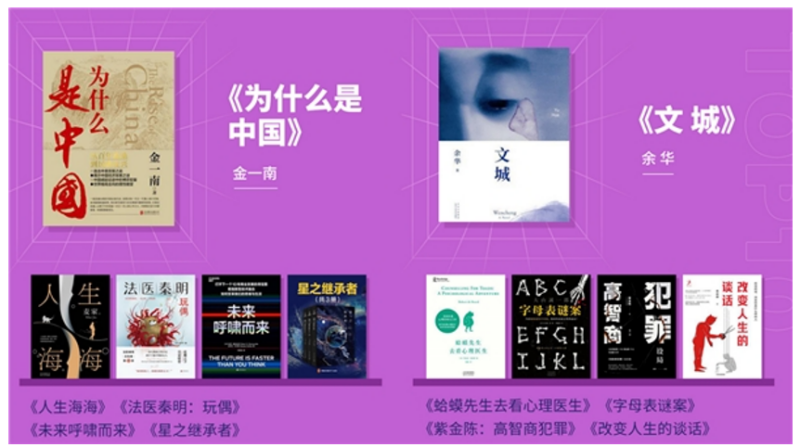
Severe competition of the eBook reading market: Who are the leading players?
Mobile reading APPs
Without carrying traditional books or e-readers, users can download and browse massive eBook resources by only a mobile phone. Therefore, it is popular for the Chinese to read via mobile reading APPs. According to Chinese Academy of Press and Publication, 76.7% of Chinese adults use phones to read.
In China, the leading player of mobile reading APP is Ireader (掌阅), securing 87.5 million Monthly Active Users (MAUs) according to Statista. On the other hand, QQ Book and Migu Reading ranked second and third with 58.7 million and 17.9 million monthly active users respectively.
Chinese mobile reading APPs have different business models. For example, Ireader uses episodic model subscription, thus allowing readers to access content after paying a certain amount of money (the access is mainly to either the whole book or some chapters). Instead, Weread relies on unlimited subscription. In fact, as long as readers pay a fixed monthly price, they could enjoy unlimited access to eBooks.
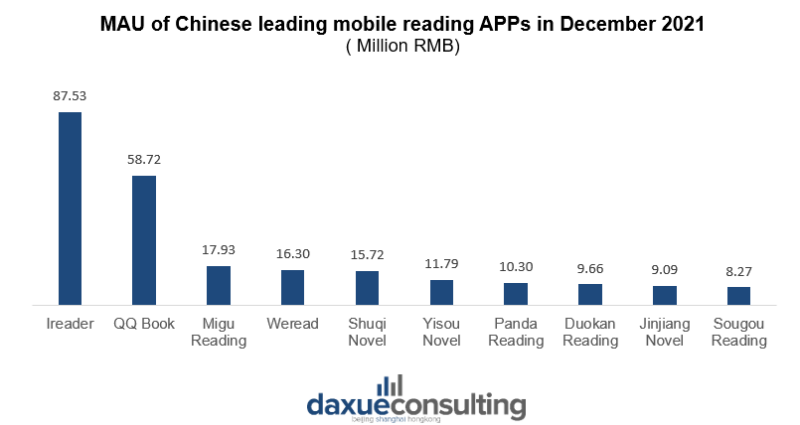
E-readers
With technological advancement, the reading experience of e-readers are more similar to paper books. According to Chinese Academy of Press and Publication, 27.2% of adult citizens use e-readers to read, recording an increase of 2.4% compared to 2019. Although the penetration rate of e-readers remains low compared to mobile reading APPs, it is still a potential market as people who use e-readers are mainly deep reader users. They have a high consistency and loyalty towards reading eBooks and this benefits the development of digital reading.
The competition of e-readers is fierce in China. Although Kindle was the only leading player before 2016, its business has been shrinking as many local e-reader brands pop up and capture Kindle’s market share. For example, iFlytek (科大讯飞), Ireader (掌阅), BOOX (文石阅读) have designed products that are light and have powerful functions. Furthermore, Chinese e-reader brands are able to design products that fit local reading habits. In 2022, technology giant Huawei announced the release of its first ever e-reader, the MatePad Paper. Besides the normal functions like taking notes, the MatePad Paper has the potential to be a productivity device which act similar to an Android tablet equipped with an E-Ink screen. This may indicate a new step of innovation of Chinese e-readers.
Key takeaways form Chinese eBook market
- There are various business models in Chinese eBook Market. Besides the paid-reading business model where the hardware equipment (i.e. e-readers), content copyright and membership fee are the main revenue sources, companies can utilize the free-reading business model to enjoy a new advertisement method. In 2019 Q4, the free-reading market size reached RMB 250 million, which is a 108% Y-o-Y growth. As advertisements are the main source of revenue for such model, companies can make use of the huge free-reading population and do in-APP advertising to have a wide reach.
- In a fierce competitive landscape of Chinese eBook market, it is more difficult for an individual eBook reading platform to stand out than before. Thus, platforms have a high demand of unique content as it is a tool for them to own competitive advantage. Therefore, publishers and individual authors are acquiring higher bargaining power to sell their copyrights in China.
- Chinese citizens are continuously looking for trendy reading experience. With the growth of the sound economy and the online audio market, people are not satisfied of just reading words only but also multimedia reading experience. Hence, audio book market is said to be the next blue ocean in China.
Author: Lydia Choi





